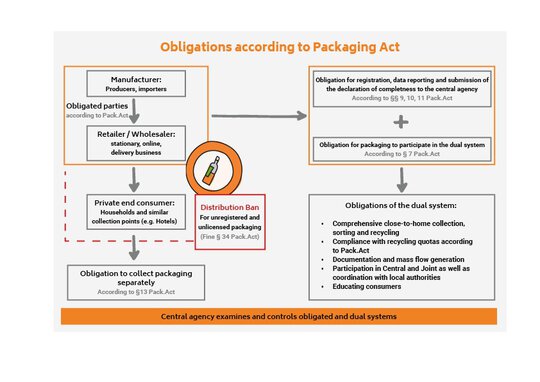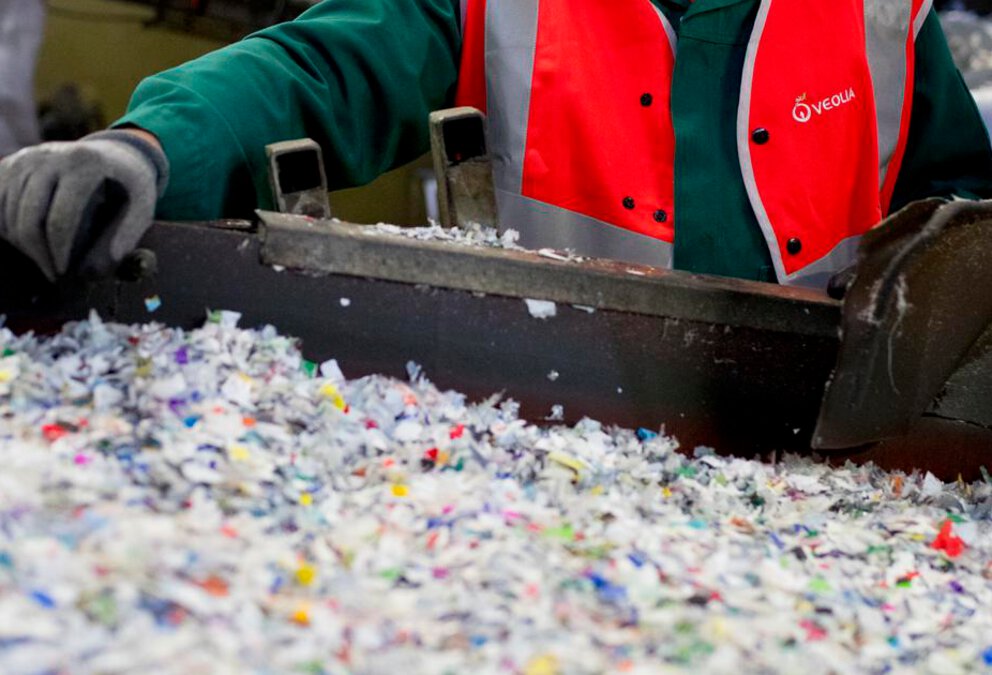
Everyone wins with the new Packaging Act - companies, people, but above all the environment & nature!
Transparency in the licensing of packaging and more recycling
Every year, large amounts of packaging waste are produced in German households - and the trend is rising. Only a clearly regulated and transparent recycling system - from waste separation at private consumers, to collection, to professional recycling - can reduce the negative impacts of packaging waste to a minimum and at the same time create the conditions for fair competition. To achieve this it is important that all market participants involved in the recycling process are held accountable and work together.

The main goal: More packaging recycling in Germany
In order to further improve packaging recycling in Germany and to further develop the circular economy, the Packaging Act focuses more strongly on the topic of recycling than the previously applicable Packaging Ordinance. The main goal of the Packaging Act is to gradually increase the recycling quotas for the different types of materials: since 2022, for example, 90 % of glass and paper waste is to be recycled, and the recycling quota for plastic waste increased to 63 % since 2022, among other things.
According to the Packaging Act, the dual systems are obliged to provide evidence that the recycling quotas for packaging subject to system participation have been met: With the help of higher market transparency, new consumer obligations, extensive information measures and incentives for the ecological design of participation fees, the participants along the recycling cycle are encouraged by the Packaging Act to contribute directly or indirectly to the fulfilment of the recycling targets with their behaviour.
Obligation to separate waste anchored in the Packaging Act for the first time
Successful recycling begins with the correct separation of waste in private households: Because only correctly collected packaging can be recycled. Packaging that ends up in residual waste is burned. An important part of the Packaging Act is therefore that end consumers as well as comparable sources of waste generation were obliged to separate waste correctly for the first time.
This is also urgently necessary, because the collection and sorting behaviour of citizens is fundamentally important for successful recycling. Currently, around 30% residual waste, in some places even up to 60%, can be found in the yellow collection bins, which cannot be recycled and, moreover, massively hinders the recycling of correctly separated packaging.
Only if all packaging is correctly collected in the available packaging containers and separated from the residual waste, can the high recycling quotas specified by the legislator be met.
Providing more consumer information so that "Muelltrennung wirkt!"
The problem: There is still uncertainty among the population about how used and empty packaging should be collected. In order to make it easier for private consumers to separate waste correctly, the Packaging Act obliges public waste management authorities to provide "waste consulting" and the dual systems to "inform the public". This means that consumers should be informed about the purpose of separate collection, the collection systems set up for this purpose and the recycling results achieved, and ultimately be motivated to participate.
The dual systems have therefore developed the initiative "Muelltrennung wirkt!!", which provides comprehensive and easy-to-understand information material for consumers. As a manufacturer of packaging subject to system participation, you can also contribute to consumer education as an official cooperation partner of the initiative - please feel free to contact us.
More information and transparency through the Packaging Act
In addition, the Packaging Act is intended to create a transparent overview of all registered first-time distributors - and therefore ensure a fair distribution of the costs arising from the collection, sorting and (re-)recycling of used packaging. This is because distributors who do not participate in dual systems create distortions of competition, as the registered companies have to share their costs and ultimately pass them on to the end consumer. For this purpose - and as an independent control body of the dual systems - the Central Agency Packaging Register (ZSVR) was established.
Since 1 July 2022, all distributors of packaged products - irrespective of the obligation to participate - will have to register with the central body. The extended registration obligation affects the following packaging in particular:
► Service Packaging
► Transport Packaging
► Sales and Secondary Packaging in the commercial sector
► "system-incompatible" Sales and Secondary Packaging
► Sales Packaging of pollutant-containing filling goods
► Reusable Packaging.
However, manufacturers of (still) unfilled packaging are not included in the registration obligation, as they cannot be subject to the system participation obligation and are therefore not relevant for the Central Body's data reconciliation.
The Central Agency Packaging Register is responsible for monitoring manufacturers and the operators of dual systems and reports violations of the Packaging Act to the enforcement authorities, which in turn can impose fines and distribution bans: Companies that do not register or do not register correctly with the Central Agency (ZSVR), for example, face a fine of up to €100,000. Those who do not participate their packaging in a dual system can even face a fine of double that amount. In the case of serious violations, the Central Agency can even issue a ban on distribution.
Avoid fines and rely on the legally compliant service of BellandVision - find out about one of the largest dual systems in Germany now.
After the change in the law is before the change in the law: Amendment VerpackG
The Act on the Placing on the Market, the Taking Back and the High-Quality Recycling of Packaging (VerpackG) has been in force since 01.01.2019. In order to implement the requirements of the Single-Use Plastics Directive and the Waste Framework Directive, the VerpackG has now been amended as of 3 July 2021. However, transitional periods apply for some regulations. The amendment includes the following changes, for example:
► Extension of the mandatory deposit to almost all one-way plastic beverage bottles and beverage cans.
► Extension of the obligations to register for all manufacturers who place packaging on the market in Germany.
► Electronic marketplaces and fulfilment service providers will be obliged to closely monitor the system participation of sold goods.
► Authorisation of third parties and authorised representatives to report data to the central office.
Dual system creates incentives for recyclable packaging

In addition to the material fraction and packaging quantity, the recyclability of packaging and the use of recyclate and/or renewable raw materials are to be taken into account in greater depth from 2019.
Recyclate and/or renewable raw materials are to be taken into account when calculating the fee of packaging subject to system participation. The legislator supports this by setting minimum standards for the assessment of the recyclability of packaging.
Do you have questions about how to make your packaging more sustainable? together with our cooperation partners, such as Circpack by Veolia or Quality Circular Polymers, we can help you to make your packaging more recyclable and to use recycled materials.